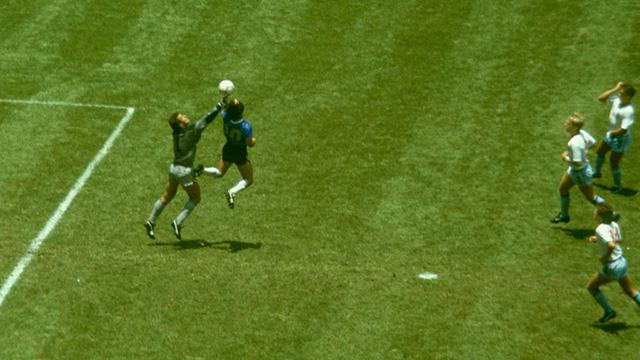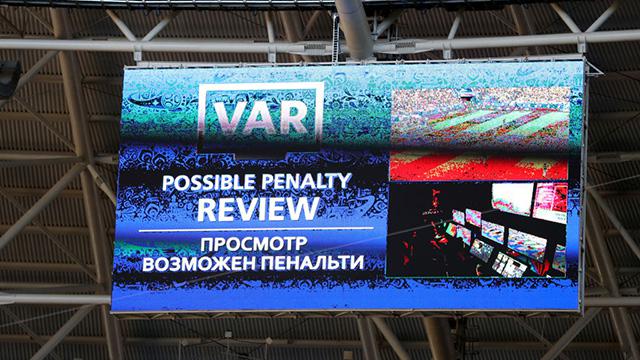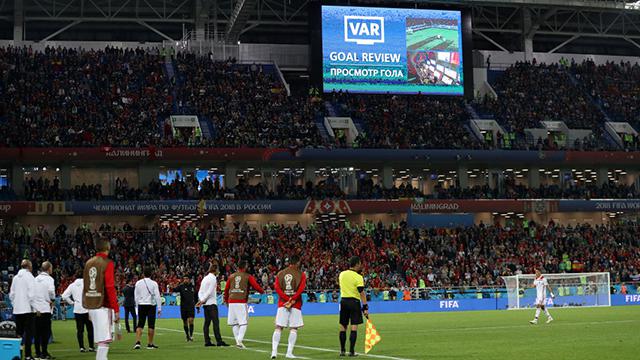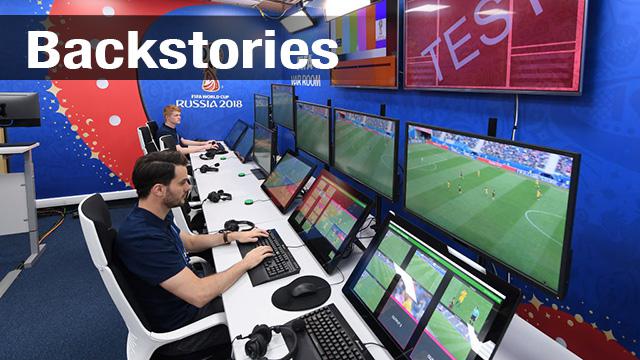Avoiding misjudgment
The 1986 quarterfinal between England and Argentina saw one of the defining moments in World Cup history. In the 51st minute, Diego Maradona went up for the ball and punched it over England keeper Peter Shilton into the back of the net. He christened the goal "The Hand of God." Argentina won the match 2-1 and were champions at the end of the tournament, raising Maradona to deity status in the country. But the hand that lifted him there would almost certainly have been disallowed with VAR.

The World Cup is littered with moments like that, where referees miss calls that may have swung the direction of games, of entire tournaments. VAR was introduced to reduce these instances. Similar systems have long been in place in other sports, and FIFA decided to follow suit.
The system
In addition to the four on the pitch, four other referees have been officiating World Cup matches remotely. The video assistant referee and three assistants watch the match from a studio in Moscow. They contact the head referee on the pitch if they see apparent misjudgments concerning goals, penalty decisions, and red cards. They also advise if the wrong player is carded.
If the head referee that a situation warrants further review, he watches a replay on a pitch-side monitor. Head of the FIFA VAR Referring Project Roberto Rossetti is quick to stress that the head referee is still the lead official. "At the center of the decision-making process, there is the referee," he says. "The VAR doesn't decide."

The first decision
VAR came into the spotlight on Day 2 of the tournament, when Spain took on Portugal.
There was a question of a foul in the build-up to Spain's 24th minute equalizer. Diego Costa had made contact with a Portuguese defender seconds before he scored. But the VAR in Moscow checked the footage and confirmed there was no foul; the goal was valid.
During the France-Australia match the next day, VAR overruled a referee decision for the first time. The lead referee did not call a foul after a French player fell in the box. But the VAR told him he should review the play and he went over to the pitch-side monitor. On second viewing, he saw that the French player had been fouled. He whistled for the penalty.
FIFA: VAR is a success
Following the end of the group stage, FIFA officials briefed reporters on the accuracy of the VAR system. They hailed its effectiveness.
FIFA stats show that the system examined 335 incidents in the 48 group stage matches. In 17 cases, the head referee's decision was reviewed. In 14 of them, it was overturned. 3 times it was upheld.
"95 percent of the decisions taken by the referees without the VAR were correct, and this percentage increased to 99.3 percent thanks to the intervention of the VAR," Chairman of the FIFA Referees' Committee Pierluigi Collina said. "VAR does not mean perfection. But as you can see 99.3 percent is something that is very, very close."
"I think VAR has helped a lot," added Director of FIFA Refereeing Massimo Busacca.

Pros and cons
Nonetheless, reception of the system has been mixed. Some have praised it for overturning incorrect decisions. Others have criticized it for slowing down the pace of play.
The final round of matches in Group B highlights both sides of the argument. Spain and Portugal entered play on 4 points, with Iran on 3. The last two matches would decide who advanced.
Spain struggled against Morocco, and looked to be heading for a loss until Iago Aspas found the net in second half added time. The goal was incorrectly ruled offside. But the decision was overturned after VAR review. The game ended in a draw, and Spain advanced. They may not have had this game taken place 4 years ago.
But the Iran-Portugal match has been taken up by critics of the system. It was a heated game, as both sides knew they would be eliminated with a loss. And the three VAR reviews seemed to disrupt any flow there could have been. The players looked visibly annoyed at how long it was taking the referee to make some of the decisions. The game ended 1-1, with Portugal advancing.

Experts and players say
Alan Shearer, the former England star and current BBC commentator, called VAR "a farce" when referencing the Iran-Portugal match on Twitter. He criticized the system for ruining the game.
Toshiya Fujita, former member of the Japan national team and NHK commentator, says VAR interrupts games. "Judging from my playing experience, I think the system creates awkwardness by causing these pauses in the play." However, he adds it is a good thing that matches are being decided by accurate decisions. "I think the correct calls will convince players," he says.
Iranian midfielder Saeid Ezatolahi had a goal disallowed against Spain. He said he didn't know what to say but added that maybe the goal shouldn't have stood in the first place.
Denmark player Yussuf Poulsen said he was frustrated after a VAR review awarded a penalty against him. He said if the system has to be used, it should be used to review every single call.
Tougher Decisions
The quarterfinals will be played over the next two days. As the stakes get higher, VAR will be relied upon to make increasingly sensitive calls. After being highlighted by FIFA for its accuracy, the system will be under an even bigger spotlight as the tournament reaches its climax.
